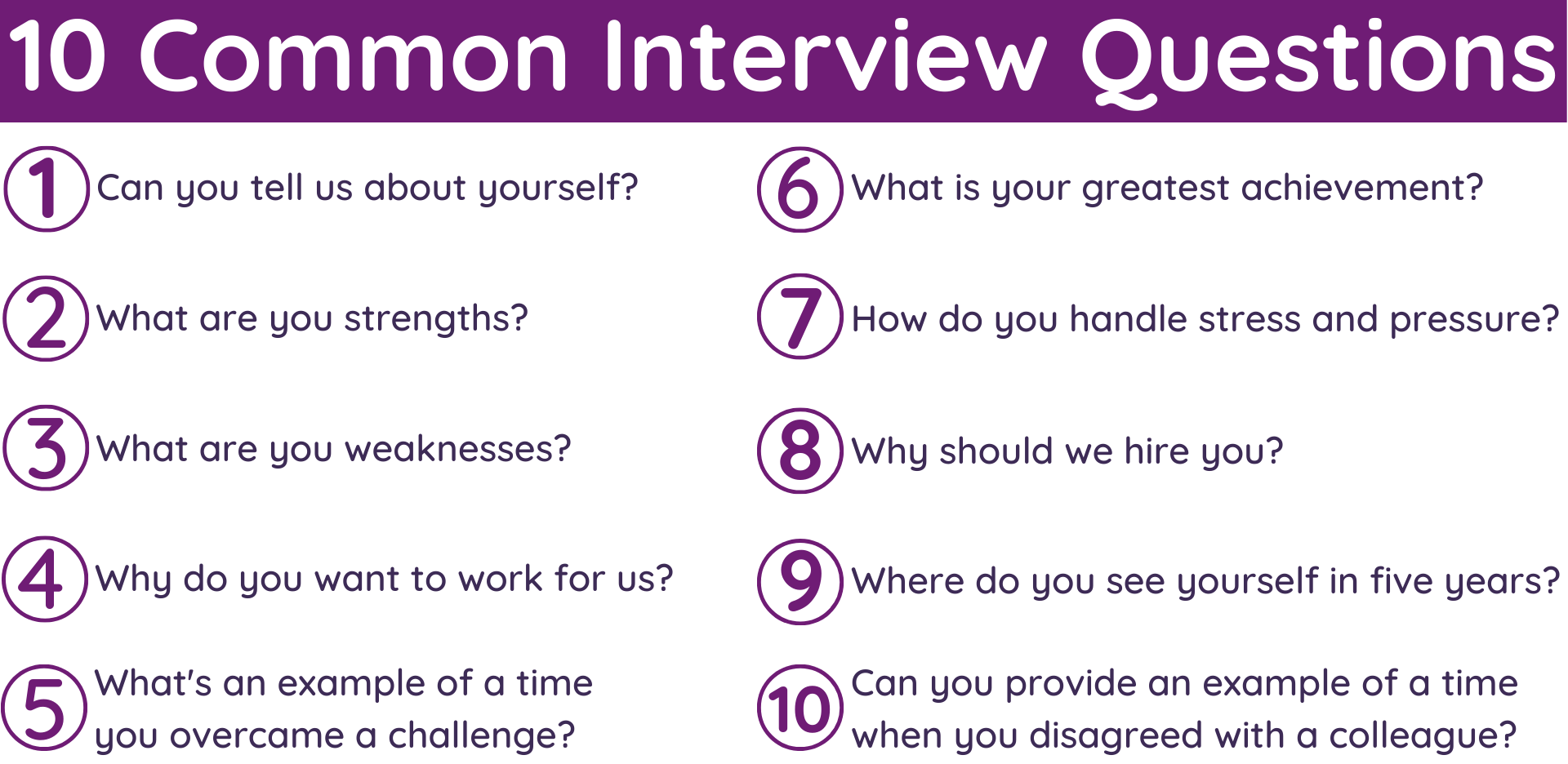
Mastering the Interview: Acing the Top 10 Questions with Confidence
Conquer Your Interview: Master the Top 10 Questions (and Avoid Common Mistakes!)
By: Javid Amin
Congratulations on landing that interview! It’s an exciting step towards your next career move. But now comes the preparation – anticipating the questions and crafting compelling answers.
This guide delves into the ten most frequently asked interview questions, providing insights and strategies to help you not just answer them, but truly shine. We’ll explore each question in detail, offering actionable tips, insightful examples, and even addressing potential pitfalls to avoid. Remember, a successful interview is a two-way street. By showcasing your skills and genuine interest in the position and company, you’ll leave a lasting impression on the interviewer.
1. Tell Me About Yourself
This seemingly broad opener is your chance to make a strong first impression. Avoid a generic life story. Instead, tailor your response to the specific job you’re applying for. Briefly weave in relevant skills and experiences that demonstrate you’re a perfect fit.
Example: (For a Marketing Manager position) “I’ve always been passionate about crafting compelling narratives and building brands. Throughout my career, I’ve honed my skills in digital marketing, content creation, and social media strategy. In my previous role at [Previous Company], I spearheaded a social media campaign that increased brand awareness by 30%. I’m particularly drawn to [Company Name]’s innovative approach to marketing, and I believe my experience aligns perfectly with your focus on data-driven strategies.”
2. Why Do You Want This Job?
This question goes beyond simply needing a job. Show genuine enthusiasm for the specific role and company. Research the company beforehand. Highlight aspects of the job description that resonate with your career goals and skillset. Demonstrate you’ve done your homework!
Example: “I’m particularly interested in this role at [Company Name] because of your commitment to [Company Value – e.g., sustainability, innovation]. In my previous role, I spearheaded a project that aligned with this value, and I’m eager to contribute my skills and knowledge to a company that shares my priorities. Additionally, the opportunity to work on [Specific Project] mentioned in the job description is very exciting, as it leverages my expertise in [Your Relevant Skill].”
3. Why Should We Hire You?
This is your moment to sell yourself and your value proposition. Convince the interviewer why you’re the best candidate for the job. Briefly showcase your strengths and how they directly benefit the company. Don’t be shy – this is your chance to shine!
Example: “My proven track record in [Area of Expertise] demonstrates my ability to deliver results. In my previous role, I consistently exceeded targets by [Quantifiable Achievement]. I’m a highly motivated and results-oriented individual with strong communication and collaboration skills. I’m confident that I can seamlessly integrate into your team and make a significant contribution to your company’s success.”
4. What Are Your Strengths and Weaknesses?
Self-awareness is a key quality employers seek. Address strengths first, speaking confidently and providing specific examples to back up your claims. When mentioning weaknesses, acknowledge a growth area and demonstrate how you’re actively working to improve.
Example (Strengths): “One of my strengths is my ability to [Strength]. For instance, in my previous role, I [Example of how you used your strength to achieve a positive outcome].”
Example (Weaknesses): “An area I’m actively working to improve is [Weakness]. I’ve taken steps to address this by [Action you’re taking to improve]. I’m a fast learner and confident that I can continue to develop this skill further.”
5. Where Do You See Yourself in Five Years?
This question isn’t about predicting the future with perfect accuracy. Instead, showcase your ambition and demonstrate that your goals align with the company’s direction. Show you see this role as a stepping stone in your desired career path.
Example: “In five years, I see myself as a [Desired Future Position] within a company like yours. This role aligns perfectly with my long-term goal of specializing in [Area of Expertise]. I’m confident that the skills and experience I’ll gain here at [Company Name] will equip me to achieve this goal.”
6. Tell Me About a Time You Faced a Challenge and How You Overcame It
This question assesses your problem-solving and resilience skills. Describe a specific situation where you encountered a hurdle. Explain the steps you took to address it, highlighting your decision-making process and initiative. Focus on the positive outcome and the lessons learned.
Example: “In my previous role at [Previous Company], we faced a challenge when [Describe the Challenge]. I took the initiative to [Action Taken 1] and [Action Taken 2]. Through effective communication with my team, we were able to [Positive Outcome]. This experience taught me the importance of [Lesson Learned].”
7. Describe a Time You Worked Effectively in a Team
Collaboration and teamwork are crucial for success in most workplaces. Give an example where you collaborated with others to achieve a goal. Highlight your communication, teamwork, and problem-solving skills within the group.
Example: “In my previous role, I was part of a team tasked with [Project Description]. I utilized my strong communication skills to [How you communicated effectively] and delegated tasks based on team members’ strengths. By working collaboratively, we were able to [Positive Outcome].”
8. Why Are You Leaving Your Current Job?
Honesty and transparency are key here. Stay positive and focus on why you’re seeking a new opportunity. You can mention career growth, the desire for a new challenge, or a better fit for your skillset. Avoid bad-mouthing your current employer.
Example: “While I appreciate my time at [Current Company], I’m seeking a new opportunity that allows me to further develop my skills in [Area of Expertise]. This role at [Company Name] aligns perfectly with my career goals of [Career Goals].”
9. What Are Your Salary Expectations?
Do your research beforehand! Salary websites and industry publications can provide insights into typical salary ranges for the position and your experience level. Be prepared to negotiate, but show willingness to work within a reasonable range.
Example: “Based on my research and experience, I’m targeting a salary range of [Salary Range]. However, I’m more focused on finding the right fit and a company that values my skills and offers opportunities for growth.”
10. Do You Have Any Questions for Us?
This is your chance to demonstrate your genuine interest in the company and the role. Prepare thoughtful questions about the company culture, the team, the day-to- day aspects of the role, or upcoming projects. This shows you’ve done your research and are genuinely interested in the opportunity.
Example: “I’m particularly interested in learning more about [Company Culture or Specific Project]. Additionally, I’d be grateful if you could elaborate on [Specific Aspect of the Job].”
Remember:
- Be confident and enthusiastic. Your body language and tone of voice matter just as much as your words.
- Dress professionally. First impressions are important.
- Follow up with a thank-you email. Thank the interviewer for their time and reiterate your interest in the position.
By following these tips and mastering the top interview questions, you’ll be well on your way to landing your dream job!
Bonus Section: Common Interview Mistakes to Avoid
- Arriving late or unprepared.
- Speaking poorly about your previous employer.
- Appearing disinterested or unenthusiastic.
- Giving vague or unclear answers.
- Bragging or boasting about your accomplishments.
- Lying on your resume or during the interview.
Additional Tips:
- Practice makes perfect: Rehearse your answers aloud beforehand to build confidence and ensure your delivery is clear and concise.
Conclusion: Acing an interview requires preparation, confidence, and a strategic approach. By understanding the common questions and crafting compelling answers, you can make a lasting impression on the interviewer and stand out from the competition. Remember, the interview is a two-way street. Showcasing your skills and genuine interest will not only help you land the job, but also find a company that aligns perfectly with your career goals.

